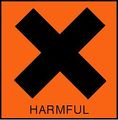MSDS - Glycerol
Revision as of 22:01, 25 June 2011 by Bio-rich-time-poor (talk | contribs) (Created page with " <gallery widths="120px" heights="120px" perrow="1" align="left"> File: Symbol - harmful.jpg </gallery> <br> <br> <br> <br> <br> <br> <br> <br> Glycerol material data safety...")
Glycerol material data safety sheet. Reproduced with kind permission of the Department of Chemistry, Oxford University.
Last updated April 1, 2005
IMPORTANT: The Glycerol produced as a by-product of Biodiesel is NOT pure Glycerol. The by-product will contain significant amounts of Methanol, Sodium Hydroxide or Potassium Hydroxide, water and contaminants from the feedstock. Therefore Biodiesel by-product Glycerol should be treated as a mixture of all of the preceding and safety precautions pertaining to all the components should be observed. This MSDS is included in the interests of completeness.
| Common synonyms |
|
| Formula | C3H8O3 |
| Properties |
|
| Principal hazards |
|
| Safe handling |
|
| Emergency |
|
| Disposal |
|
| Protective equipment |
|
| Further information | More extensive safety data |
Bio-rich-time-poor 22:01, 25 June 2011 (BST)
